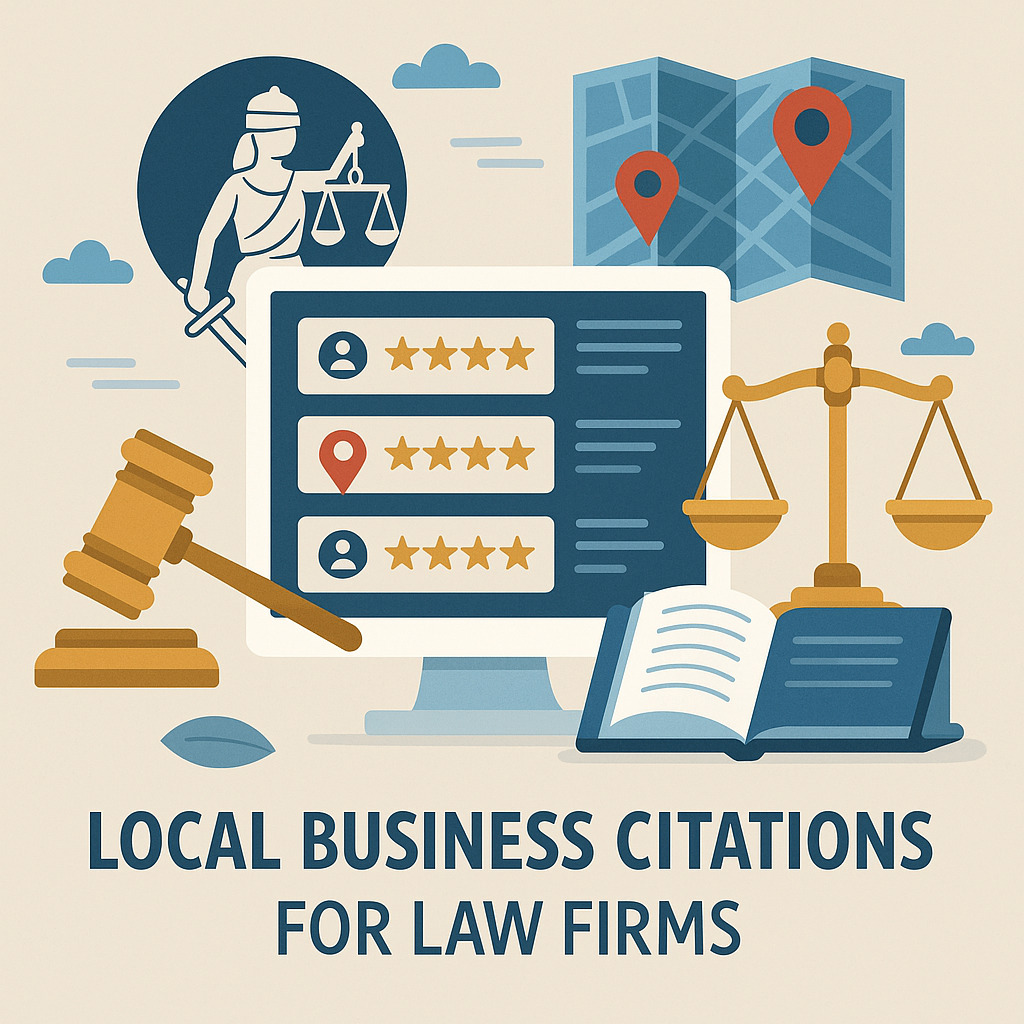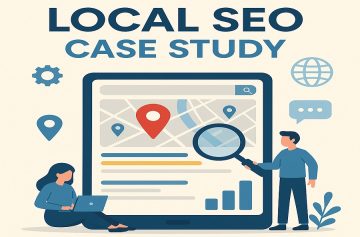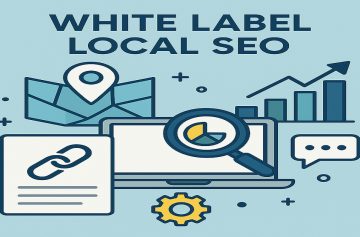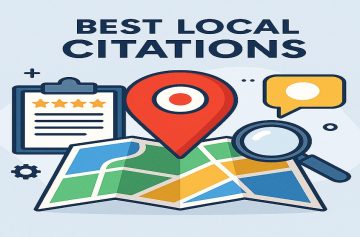What Are local business citations for law firms and Why Are They Important for Law Firms?
Local business citations refer to mentions of your law firm’s name, address, and phone number (NAP) on other websites, online directories, and platforms. These citations may or may not include a link back to your website. They are crucial for establishing your law firm’s online presence and credibility, especially in local search results.
Understanding Local Business Citations
Local business citations are essentially references to your law firm’s information across the internet. These references can appear on a variety of platforms, such as:
- Business directories (e.g., Yelp, Yellow Pages)
- Local news websites
- Chamber of commerce sites
- Industry-specific directories
- Google My Business listing
- Social media platforms
These citations typically include your NAP (Name, Address, Phone number) and, sometimes, additional details like your website, business hours, or services.
While citations might not always include a clickable link to your website, they still play a significant role in local SEO by helping search engines like Google identify and validate your business’s existence and location.
The Role of Citations in Local SEO
Citations are a foundational element of Local SEO (Search Engine Optimization), which helps law firms rank better in local search results, such as “best lawyers near me” or “personal injury law firm in [City].” Here’s why they matter:
- Improving Local Search Rankings: When your law firm is consistently listed across various online directories with accurate details, search engines recognize your business as legitimate and authoritative, which boosts your local SEO rankings. This is crucial for appearing in local search results, particularly the Local Pack, which features top results on Google Maps.
- Enhancing Trust and Credibility: Citations, particularly on well-known and reputable platforms, increase the trustworthiness of your law firm. Google sees these citations as signals of authority and relevance in your local area. The more citations your law firm has, the more likely it is to be perceived as a credible business by both search engines and potential clients.
- Increasing Visibility and Local Presence: Citations help your law firm appear in search results and local listings, making it easier for potential clients to find your services when searching online. This is especially important for law firms that depend on local clients, as the majority of potential clients will perform online searches when looking for legal help.
Why Are They Important for Law Firms?
Local business citations are essential for law firms for several reasons:
- Local Client Acquisition: Law firms primarily serve local clients, and most people search online for local services. Citations increase the chances that your law firm will appear in local search results, leading to more inquiries and potential clients.
- Building a Strong Online Presence: A consistent and widespread presence across multiple citation sources strengthens your law firm’s online presence. The more places your NAP appears correctly, the more visibility you gain in local search results.
- Improving Reputation and Trust: Citations on trusted, industry-specific platforms can help your law firm gain credibility. When potential clients see your firm listed in reputable directories or platforms, it creates a sense of trust, making them more likely to reach out.
Understanding Local Business Citations
Definition of Local Business Citations
A local business citation refers to any online mention of your business’s name, address, and phone number (NAP). These citations often appear in directories, review sites, social media platforms, and other online listings. They serve as a reference for search engines and customers to verify your business’s existence, location, and contact details.
In simple terms, citations are like digital “mentions” of your law firm on the internet. These can include your business information in various formats, such as:
- Listing on local business directories (e.g., Yelp, Yellow Pages).
- Mentions on industry-specific websites (e.g., legal associations).
- Social media platforms where your business is tagged.
- Online reviews and forums where your business is discussed.
While citations often don’t link back directly to your website, they are still vital for your online visibility, particularly for local SEO.
How Citations Differ from Backlinks
While citations and backlinks are both important components of SEO, they differ significantly in terms of their function and impact:
- Citations (NAP Mentions):
- Focus: Citations refer to the consistent listing of your business’s name, address, and phone number across various online platforms.
- Function: They act as proof that your business exists and is relevant in the local area. Citations help search engines like Google confirm your law firm’s legitimacy and improve local search rankings.
- SEO Impact: Citations help improve your law firm’s local SEO, boosting visibility in local searches like “lawyer in [city].” They don’t necessarily link directly to your website, but they improve trust and relevance in local search results.
- Backlinks:
- Focus: Backlinks are hyperlinks from one website to another. When another website links to your law firm’s website, it is considered a backlink.
- Function: Backlinks act as “votes of confidence” from other websites, signaling to search engines that your website is authoritative and relevant. A strong backlink profile from reputable websites increases your website’s authority.
- SEO Impact: Backlinks primarily influence your overall SEO (not just local SEO). Quality backlinks improve your website’s position in search results across a broader range of keywords and topics.
Key Differences:
- Nature: Citations provide basic business information, whereas backlinks are clickable links that send users to your website.
- SEO Effect: Citations help improve local SEO and trust, while backlinks have a broader impact on your site’s authority and overall ranking.
- Direct Link: Citations usually don’t include direct links to your website, whereas backlinks always link back to your site.
How to Get Local Business Citations for Your Law Firm
Securing local business citations is an essential part of improving your law firm’s online visibility and local SEO rankings. Below are some top citation sources that can help you get started with building citations for your law firm.
Top Citation Sources for Law Firms
- Google My Business
- Why It’s Important: Google My Business (GMB) is one of the most essential citation sources for any local business, including law firms. It helps your law firm appear in Google search results and Google Maps, allowing potential clients to easily find your contact information and read reviews.
- What to Do: Claim and optimize your GMB listing by filling in all the relevant details like your NAP (Name, Address, Phone number), website, hours of operation, and a business description.
- Yelp
- Why It’s Important: Yelp is one of the most trusted review platforms where clients often search for law firms and leave reviews. It helps improve your online reputation and credibility.
- What to Do: Create a business profile for your law firm, encourage clients to leave reviews, and respond to them professionally.
- Yellow Pages
- Why It’s Important: Yellow Pages remains a prominent business directory for local services. It’s widely used by people looking for professional services like law firms in their area.
- What to Do: Ensure that your business information is accurate and up-to-date in the Yellow Pages directory.
- Bing Places for Business
- Why It’s Important: Similar to Google My Business, Bing Places allows your law firm to be listed on Bing’s search engine and map. While not as popular as Google, it still contributes to your overall local SEO.
- What to Do: Claim your listing and ensure all details are consistent with other citation sources.
- Facebook Business Page
- Why It’s Important: Having a Facebook business page not only gives your law firm a social media presence but also serves as a citation source with your NAP details. Many potential clients will look for law firms on Facebook for reviews, services, and engagement.
- What to Do: Set up and optimize a professional business page with accurate information, including contact details and services provided.
Industry-Specific Citation Websites
In addition to general online directories, it’s important for law firms to get listed on industry-specific citation websites that are trusted by both search engines and potential clients in the legal field. Below are some top industry-specific directories and platforms to consider:
- Avvo
- Why It’s Important: Avvo is a well-known legal directory where lawyers can list their profiles, showcase their expertise, and receive reviews from clients. It’s a trusted resource for those seeking legal advice.
- What to Do: Create a detailed Avvo profile with your NAP, practice areas, and any legal credentials or certifications. Encourage clients to leave reviews.
- FindLaw
- Why It’s Important: FindLaw is one of the most trusted legal directories. Listing your law firm here can increase your visibility and credibility within the legal community and with potential clients.
- What to Do: Set up a law firm profile with a complete listing of your contact details, services, and relevant experience. Ensure the NAP is accurate and consistent.
- Justia
- Why It’s Important: Justia is another widely recognized legal directory. It provides law firm listings and articles, which can help increase your visibility in search results related to legal services.
- What to Do: Claim your law firm’s profile and include a thorough description of your services, expertise, and client reviews.
- Martindale-Hubbell
- Why It’s Important: Martindale-Hubbell has been around for over 140 years and is one of the most respected legal directories. It offers attorney ratings, reviews, and detailed information about law firms.
- What to Do: Claim your listing and showcase any peer or client reviews. This platform helps in building both authority and trustworthiness.
- Lawyers.com
- Why It’s Important: Lawyers.com is a directory designed specifically for legal professionals. It helps people looking for law firms easily find the right match and provides listings by practice area and location.
- What to Do: Create and maintain an up-to-date profile with accurate NAP information and a compelling description of your services.
- The National Trial Lawyers
- Why It’s Important: This is a membership-based organization for top trial lawyers. Being listed here adds prestige and can attract potential clients searching for the best trial attorneys in your area.
- What to Do: If eligible, apply for membership and ensure your listing is complete and up-to-date.
- Better Business Bureau (BBB)
- Why It’s Important: While not strictly legal-focused, being listed in the BBB directory signals credibility and trustworthiness, which are essential factors for clients seeking legal assistance.
- What to Do: Apply for BBB accreditation and ensure your law firm’s listing is accurate.
Submitting Your Law Firm’s Information Correctly
Importance of Accurate and Consistent Business Details (NAP)
Accurate and consistent business information, known as NAP (Name, Address, Phone number), is one of the most critical factors for effective local SEO. For law firms, submitting your NAP consistently across all citation sources is essential for:
- Improved Search Engine Rankings: Search engines like Google use consistent NAP details to verify your law firm’s legitimacy. When your business information is uniform across different platforms, search engines are more likely to trust your law firm, boosting its rankings in local search results.
- Avoiding Confusion for Clients: If your law firm’s address or phone number is incorrect or inconsistent, potential clients may have trouble reaching you. It can also create confusion when clients try to find your business on maps or review platforms, leading to missed opportunities and potential loss of clients.
- Building Trust and Credibility: Consistent NAP information across directories, websites, and review platforms signals to both search engines and clients that your law firm is credible and reliable. Inconsistent or outdated information, on the other hand, can harm your online reputation.
Best Practices for Submitting Your Law Firm’s Information
To ensure that your law firm’s NAP is consistent and accurate across citation sources, follow these best practices:
- Use the Same Format Everywhere: Ensure that the formatting of your business name, address, and phone number is identical across all platforms. For example:
- Name: Use your official business name without abbreviations (e.g., “John Doe Law Firm” rather than “John Doe Law”).
- Address: Always include the exact address as it appears on official documents (e.g., “123 Main Street” rather than “123 Main St”).
- Phone Number: Use the same format for your phone number (e.g., (555) 123-4567 vs. 555-123-4567).
- Claim and Update Listings on Multiple Platforms: Make sure to claim your business profile on popular citation sites and directories (e.g., Google My Business, Yelp, Avvo). After claiming your listing, regularly review and update it to ensure it reflects the most accurate and up-to-date information.
- Add Additional Information: In addition to NAP details, include other relevant information, such as:
- Business hours
- Services offered
- Photos or logos
- Website URL
- Payment methods accepted
- Use Structured Data Markup (Schema.org): On your website, consider using structured data markup to help search engines better understand your law firm’s business details. This can further help improve your search engine visibility.
- Monitor Your Listings: Over time, monitor your law firm’s citations to ensure that no changes or errors occur. Use tools like Moz Local or BrightLocal to track your listings and identify any inconsistencies.
Local Citations vs. National Citations: Which Is Best for Law Firms?
Differences Between Local and National Citations
- Local Citations:
- Focus: Local citations specifically mention your law firm’s NAP details within local or regional directories and platforms. These citations are more likely to target specific geographical areas.
- Examples: Local business directories, regional legal association websites, city-specific directories (e.g., Chamber of Commerce websites, local news outlets).
- Impact: Local citations are crucial for improving your law firm’s local SEO and helping it rank in localized searches (e.g., “Personal injury lawyer in [City]”). These citations contribute to a higher presence in the Google Local Pack and Google Maps results, which are highly beneficial for attracting local clients.
- National Citations:
- Focus: National citations are broader and appear in widely recognized directories and platforms that don’t focus on a specific geographical area. These are typically larger, more general platforms that list businesses nationwide.
- Examples: National directories like Yelp, Yellow Pages, and lawyers.com.
- Impact: While national citations can provide a broader online presence, they are generally less effective at improving local SEO compared to local citations. National citations are important for your overall online visibility and building your authority but don’t target your specific geographic area.
Why Local Citations Matter More for Law Firms
For law firms, local citations are significantly more important than national citations, especially if your primary target audience is within a specific geographic location. Here’s why:
- Local Search Rankings: Local citations directly contribute to ranking in local searches. When clients search for legal services in your area (e.g., “divorce lawyer in [City]”), local citations help search engines understand where your law firm is located, which increases your chances of showing up in the Local Pack (the top three results that appear on Google Maps).
- Targeted Audience: Law firms generally serve local clients, so local citations are more relevant. By listing your law firm on local platforms (e.g., city directories, regional legal associations), you can attract clients from your immediate area, rather than a broader, nationwide audience.
- Trust and Relevance: Search engines like Google prioritize local relevance when displaying results for location-based searches. Local citations help signal to search engines that your law firm is relevant to the local area, increasing the likelihood of your business appearing in localized results.
- Increased Client Engagement: Clients searching for legal services are typically looking for businesses within their vicinity. Local citations increase the likelihood of potential clients finding your law firm when they search for specific legal services in your geographic location, resulting in higher engagement and conversion rates.
The Impact of Local Citations on Your Law Firm’s Online Reputation
Local citations are not just a tool for improving local SEO; they also play a significant role in shaping your law firm’s online reputation. By ensuring that your law firm’s information is accurately and consistently listed across multiple platforms, you can increase trust, credibility, and visibility, leading to more clients and stronger brand recognition.
How Citations Influence Trustworthiness
1. Importance of Positive Reviews and Accurate Citations
Citations are a powerful way to establish your law firm’s trustworthiness. When clients search for legal services, they want to know that they are dealing with a reputable, legitimate business. Accurate and consistent citations, coupled with positive reviews, significantly contribute to this perception. Here’s why:
- Accurate Citations: When your NAP (Name, Address, Phone number) information is listed consistently across directories, review sites, and industry-specific platforms, it signals to both search engines and potential clients that your law firm is reliable. Inconsistent or incorrect citations can cause confusion and lead to a lack of trust, making it difficult for clients to reach you or verify your legitimacy.
- Positive Reviews: Citations often include client reviews or ratings, which play a direct role in shaping the perception of your law firm. Positive reviews, in particular, enhance your reputation and build trust with potential clients. When clients see that other people have had positive experiences with your services, they are more likely to choose your firm.
- Social Proof: Citations with positive feedback or testimonials create social proof, which strengthens the credibility of your law firm. The more reputable platforms your law firm is listed on, the more it appears to be an established, trustworthy business in the eyes of both search engines and clients.
2. How Citations Build Credibility with Search Engines and Clients
Citations act as a digital verification of your law firm’s existence, location, and services. Search engines like Google use citations to gauge your law firm’s credibility and authority. Here’s how citations contribute to your law firm’s credibility:
- Search Engine Trust: When your law firm’s NAP is consistently listed on reputable directories and platforms, search engines view this as a signal that your business is legitimate. This consistency helps improve your rankings in local search results, particularly in the Google Local Pack, which often features law firms in local search queries.
- Boosting Local SEO: Citations also help Google determine your relevance to a specific geographical area. The more accurate and widespread your law firm’s citations are, the more likely you are to appear in local searches and on Google Maps. For example, when a potential client searches for “personal injury lawyer in [City],” Google is more likely to display your law firm if it finds consistent and accurate citations across various local and legal platforms.
- Client Confidence: For potential clients, seeing your law firm listed in well-known, trusted directories or review platforms increases their confidence in your services. It gives them the assurance that your law firm is active and recognized, and that it’s committed to maintaining transparency and providing quality legal services.
Increasing Client Conversions Through Citations
Citations can directly influence the decision-making process of potential clients. Here’s how accurate and positive citations can increase your client conversions:
1. How Citations Can Attract More Clients to Your Law Firm
- Visibility in Local Search: One of the main benefits of citations is the improvement in local search rankings. As your law firm is listed across various trusted citation sources, it becomes easier for clients to find you when they search for legal services in your area. Appearing on local search results means you are visible to a highly targeted audience—those who are already looking for services you provide.
- Enhanced Reputation: Positive citations with reviews act as a form of social proof. When potential clients see glowing reviews and ratings about your law firm on trusted directories, it can increase their likelihood of choosing your firm over competitors. Clients tend to trust reviews, especially those on reputable platforms, which can directly translate into more phone calls, consultations, and conversions.
- Local Trust: Clients prefer working with law firms that are well-established and active in their community. Citations on local websites, such as Chamber of Commerce sites, city directories, and local news outlets, demonstrate your law firm’s involvement in the area and can increase your appeal to local clients who are seeking nearby professionals.
2. Examples of Successful Law Firm Citation Strategies
Here are a few strategies that law firms have successfully used to leverage citations for increased visibility and client conversion:
- Claiming and Optimizing Listings on Key Platforms: Successful law firms make sure they claim their business profiles on high-authority sites like Google My Business, Yelp, Avvo, and FindLaw. They ensure that each listing is fully optimized, with a consistent NAP, detailed service descriptions, photos, and positive reviews. For example, law firms specializing in personal injury may ensure their profiles showcase testimonials from satisfied clients to boost their credibility.
- Encouraging Clients to Leave Reviews: One of the best ways to improve your citations is by actively encouraging clients to leave positive reviews. Law firms that do this effectively often see a boost in both their online reputation and their client base. A law firm could send follow-up emails or make phone calls requesting reviews from satisfied clients, especially after successful case outcomes.
- Leveraging Industry-Specific Directories: Law firms in particular benefit from being listed on industry-specific citation sources, such as Avvo, Martindale-Hubbell, and Justia. These platforms are highly respected in the legal field, and having an accurate and well-maintained profile on them can enhance a firm’s credibility. A law firm specializing in family law might focus on getting listed on directories tailored to family lawyers to ensure it reaches a relevant audience.
- Maintaining Local Consistency: Consistency is key. Law firms that take the time to ensure that their NAP information is uniform across local directories (such as local city or county websites) are more likely to rank higher in local search results. This strategy can significantly increase visibility, especially for practices focused on serving a particular geographic area.
Common Mistakes to Avoid When Using Local Business Citations
While local citations are a crucial part of your law firm’s local SEO strategy, there are several common mistakes that can undermine their effectiveness. The most significant of these is providing inconsistent or inaccurate business information. Here’s a breakdown of why this happens, the risks it carries, and how to avoid it.
Inconsistent or Inaccurate Business Information
1. Risks of Incorrect NAP Details
The accuracy and consistency of your law firm’s NAP (Name, Address, Phone number) are vital for ensuring that your law firm is easily found by potential clients and ranked properly by search engines. Here’s why inaccurate or inconsistent NAP details can negatively affect your business:
- Damaged Local SEO: Search engines like Google use NAP consistency to verify the legitimacy of your law firm. If your law firm’s NAP is inconsistent across directories or review platforms, search engines may view your business as unreliable, which can hurt your local search rankings. For example, if your address is listed as “123 Main Street” in one directory and “123 Main St.” in another, Google may not connect these listings to the same business, reducing your local SEO effectiveness.
- Confused Potential Clients: Clients who see discrepancies in your NAP details may have trouble finding or contacting you. For instance, if your phone number or address differs across citation sites, clients might end up calling the wrong number or visiting the wrong location. This confusion could lead to missed opportunities and potential clients turning to other law firms that appear more reliable.
- Reduced Trustworthiness: Inconsistent information can harm your law firm’s credibility with both search engines and clients. Google places high value on accuracy, and when NAP details don’t match across various platforms, it can signal to search engines that your business may not be trustworthy or up-to-date. Similarly, clients might question your professionalism if they see conflicting information.
How to Maintain Consistency Across Citation Sources
Ensuring that your law firm’s NAP is consistent across all citation sources is crucial for avoiding the risks mentioned above. Here are some best practices to help maintain consistency:
1. Standardize Your NAP Format
- Name: Always use the same business name across all citation platforms. Avoid abbreviations or variations unless they are part of your official business name. For example, if your firm’s official name is “Smith & Johnson Law Firm,” don’t list it as “Smith & Johnson Attorneys” or “Smith Johnson Law.”
- Address: Be consistent with how you write your address. For example, “123 Main Street” should not appear as “123 Main St.” or “123 Main St, Suite 100” on different sites. Use the same format (e.g., including or excluding suite numbers, street types, etc.) across all directories.
- Phone Number: Make sure your phone number appears the same way every time, including country codes, area codes, and formatting (e.g., (555) 123-4567 vs. 555-123-4567). The phone number should match the one listed on your website and all other citations.
2. Claim and Manage Your Listings
- Claim Your Listings: Ensure you have claimed all relevant business listings for your law firm on platforms like Google My Business, Yelp, Avvo, and other legal directories. This gives you control over your information and ensures that it’s up-to-date and accurate.
- Audit Existing Listings: Periodically review and audit all existing citations to ensure your NAP is accurate and consistent. Use tools like Moz Local, Yext, or BrightLocal to track your law firm’s citations across the web and identify any discrepancies.
- Update Incorrect Information: If you find any incorrect or outdated information in your citations, update it immediately. It’s important to correct errors as soon as possible to avoid losing credibility with both search engines and clients.
3. Use Tools to Monitor NAP Consistency
- Third-Party Tools: Utilize citation management tools like Moz Local, BrightLocal, or Yext to monitor your NAP across various citation sources. These tools can help identify inconsistencies and provide suggestions for improving your online presence.
- Structured Data Markup: Add structured data markup (schema) to your website, especially in the footer, that contains your NAP information. This markup helps search engines understand your business details and improves your ability to rank in local searches. Structured data can also help ensure consistency between your website and citations.
4. Double-Check Each Platform’s Submission Requirements
- Review Each Directory’s Guidelines: Different citation platforms may have varying requirements for submitting your NAP details. For example, some may have a specific format for addresses or phone numbers, while others may allow flexibility. Always check the requirements before submitting your business information to avoid errors.
- Include Complete Information: Ensure that each listing contains all the required information, including your business name, address, phone number, website, services, and hours of operation. Leaving out key information or submitting partial listings can lead to inaccuracies and incomplete profiles.
5. Monitor for New Listings
- Stay Alert for New Citations: New citation sites or directories may pop up over time, and they might list your law firm automatically, sometimes with incorrect NAP details. Regularly check for new listings that may have inaccurate or inconsistent information about your law firm. Setting up Google Alerts for your law firm’s name can help track new mentions or citations.
Overlooking Lesser-Known Citation Websites
While major citation websites like Google My Business, Yelp, and Avvo are essential for building a law firm’s online presence, overlooking lesser-known or niche citation websites can result in missed opportunities. These smaller, more specialized platforms can help your law firm gain visibility within specific legal communities and target local or industry-specific clients.
Benefits of Utilizing Niche Citation Sites
- Targeted Audience Reach
- Focus on Specific Niches: Niche citation websites often cater to specific industries or practice areas. For law firms, directories that focus on particular legal sectors (e.g., family law, personal injury, criminal defense) can put you in front of the exact audience looking for your type of legal services. For example, a personal injury lawyer would benefit from being listed on platforms like FindLaw Personal Injury Directory or LawInfo, which are specialized in connecting personal injury attorneys with clients.
- Local Community Focus: Many niche citation sites are geographically targeted, allowing law firms to appear in local search results that major platforms might miss. Listing on local directories such as Chamber of Commerce sites or city-specific directories ensures that your firm is visible to potential clients in your region.
- Enhanced Local SEO
- Google’s Preference for Diversity: Google values a diverse set of citations. While the major directories are important, Google also appreciates citations from less mainstream sources. Including your law firm in a wide variety of relevant local and niche directories signals to search engines that your law firm is well-established and credible within its specific legal field.
- Improved Search Engine Visibility: By getting listed on niche directories, you increase the number of citation sources that Google associates with your law firm. This additional exposure can improve your visibility in local search results, particularly for specific legal queries like “best family lawyer in [City]” or “top criminal defense attorney in [State].”
- Increased Trust and Credibility
- Industry Authority: Many smaller, niche citation platforms are respected within the legal community. Being listed on platforms that are specifically focused on law can elevate your firm’s status as an authority in the legal space. Platforms like Martindale-Hubbell or Justia are highly regarded by both clients and other legal professionals, so being included in these directories boosts your firm’s trustworthiness.
- Reputation Building: Niche citations also give you the opportunity to get reviews from peers or clients who are looking for services in your specific practice area. Positive reviews on these platforms can further enhance your firm’s reputation and attract more clients.
- Cost-Effective Marketing
- Lower Competition: Niche citation sites often have fewer law firms listed, meaning there’s less competition for attention compared to large directories like Yelp or Yellow Pages. This can give your law firm a greater chance of standing out and being noticed by potential clients who are looking for specific legal services.
- Lower Costs for Premium Listings: Many niche citation websites offer cost-effective premium listing options compared to larger platforms. This allows you to advertise your law firm at a fraction of the cost while targeting a highly relevant audience.
The Impact of Missing Out on Relevant Platforms
- Limited Local SEO Benefits
- Missing out on niche citation sites means you’re potentially ignoring platforms that can help you rank higher in localized searches. If your law firm isn’t listed in local business directories, law-specific networks, or industry-related platforms, you may be missing valuable chances to show up in local pack results or niche search queries. A personal injury lawyer not listed in personal injury directories, for example, may not show up for specialized searches.
- Reduced Online Visibility
- When you skip niche citation websites, you lose out on opportunities to increase your law firm’s overall online presence. These directories contribute to your law firm’s visibility on platforms that clients actively use to search for specific services. If your law firm is absent from these relevant sites, potential clients might choose a competitor who is listed and visible on those platforms.
- Missed Opportunities for Client Engagement
- Niche directories and platforms often provide more personalized interactions, such as reviews and ratings from clients who are specifically looking for legal services in your area of practice. By not having your law firm listed, you miss the opportunity to connect directly with these potential clients. Additionally, some of these platforms may offer tools for direct communication, like messaging features or Q&A forums, which can increase client engagement.
- Lower Authority in Your Legal Niche
- Legal professionals are often evaluated based on their presence in reputable and specialized networks. If your law firm is not listed in the appropriate niche or local directories, your firm may appear less authoritative to both search engines and clients. Being absent from important legal directories can signal to potential clients that your firm is not active in your specific legal niche or community, which could deter them from reaching out.
Key Takeaways
While major citation platforms are necessary for building your law firm’s online presence, it’s equally important to leverage niche citation websites that are relevant to your legal practice and geographic location. These platforms offer unique benefits such as improved local SEO, greater client engagement, and increased authority in your field. Failing to utilize these sources can limit your visibility, hurt your rankings, and ultimately prevent you from reaching potential clients who are actively searching for your legal services. Therefore, ensure that your law firm is listed not only on the big directories but also on specialized platforms that can help you stand out in the competitive legal market.
Measuring the Effectiveness of Your Law Firm’s Citations
Once you’ve established and submitted your law firm’s citations across various platforms, it’s crucial to monitor and measure their effectiveness to ensure they’re driving traffic, improving your local SEO, and ultimately helping you attract clients. By tracking citation performance and making data-driven adjustments, you can optimize your law firm’s online presence for the best results.
Tools for Tracking Citation Success
- Google My Business Insights Google My Business (GMB) provides valuable data about how clients interact with your law firm’s business listing. GMB Insights is an essential tool for understanding how your citations are performing across Google Search and Google Maps. Here’s how GMB Insights can help:
- Search Impressions: GMB Insights shows how many times your business profile appears in local search results and Google Maps. By tracking impressions over time, you can gauge whether your citations are contributing to more visibility.
- Actions Taken: Insights also show the actions users take after viewing your GMB profile, such as clicking for directions, visiting your website, or calling your business. This allows you to measure how effectively your citations are driving client engagement.
- Audience Insights: GMB Insights provides data on your audience, such as geographic location and time of day when users are most likely to search for your services. This can help you optimize your citations for the most relevant and effective client base.
- Performance Comparison: Google allows you to compare your GMB performance over different periods, so you can track improvements or declines in engagement related to citation updates or changes.
- Citation Tracking Software and Services For a more comprehensive view of your law firm’s citation performance across various directories and platforms, you can use specialized citation tracking software and services. Some of the most popular options include:
- Moz Local: Moz Local helps you track your law firm’s citations and NAP consistency across multiple directories and citation sources. It also provides insights into how well your listings are performing and whether they’re properly optimized for search engines.
- BrightLocal: BrightLocal offers citation tracking tools that allow you to track your listings, monitor NAP consistency, and see how your citations contribute to local search rankings. It also provides automated reports on your citation performance, helping you stay on top of your local SEO efforts.
- Yext: Yext is a comprehensive platform that allows businesses to manage and track their citations across multiple directories and websites. It offers tools to keep track of NAP consistency, monitor customer reviews, and improve citation accuracy, all while tracking performance metrics.
- Whitespark: Whitespark provides a citation finder and tracker that allows law firms to locate, track, and monitor their citations across the web. The tool helps you identify additional citation opportunities and tracks your existing citations’ impact on search engine rankings.
How to Improve Citation Performance Over Time
Once you’ve set up and tracked your citations, it’s important to regularly evaluate and improve them to maintain strong local SEO performance. Here’s how to enhance citation performance over time:
- Evaluating and Updating Your Citations
- Audit Your Listings Regularly: Over time, directories and citation platforms may change their submission guidelines, formats, or the way they display business information. Regularly audit your law firm’s citations to ensure all NAP details are still accurate, up-to-date, and compliant with each platform’s current requirements.
- Identify Inconsistent or Outdated Information: Using citation tracking tools like Moz Local or BrightLocal, you can identify any inconsistencies in your NAP across platforms. If your address or phone number has changed, it’s essential to update it everywhere to avoid confusion and maintain trust with search engines and clients.
- Monitor Client Reviews: Client reviews on citation platforms like Google My Business, Yelp, or Avvo are essential for maintaining a positive reputation. Evaluate and respond to reviews regularly. Address any negative reviews promptly and professionally, as they can impact your law firm’s trustworthiness and credibility.
- Remove Duplicate Listings: Duplicate or incorrect listings can harm your local SEO. Use tools like Whitespark to check for duplicate citations and work to remove or merge them, ensuring there’s only one accurate listing for your law firm on each platform.
- Keeping Your Law Firm’s Information Fresh and Relevant
- Add New Information and Media: Keep your citations fresh by adding updated business information, photos, logos, or even videos. Adding new content or media (such as photos of your office or team) can increase client engagement and give your listings a more professional appearance.
- Highlight New Services or Achievements: If your law firm expands its practice areas or achieves a significant milestone (such as winning a major case or receiving a professional award), update your citations to reflect this. Keeping your information relevant ensures that potential clients see your firm as dynamic and responsive.
- Optimize for Special Features: Many citation platforms offer additional features to improve your listing, such as business hours, social media links, or service descriptions. Always make sure your law firm’s listing is fully optimized for these features, making it easier for clients to find the information they need.
- Leverage Seasonal or Local Trends: If your law firm specializes in areas of law that are influenced by seasonal or local factors (e.g., tax law, personal injury, or criminal defense), consider updating your citations with information about seasonal promotions or relevant legal tips to stay top-of-mind for potential clients.
- Monitor Competitor Listings: Keep an eye on how your competitors are performing and updating their citations. If you notice they are getting more reviews, listing on new directories, or offering additional services, adjust your citation strategy accordingly to stay competitive.
Maximizing Your Law Firm’s Local SEO with Citations
Local citations are a critical component of any law firm’s local SEO strategy. They help improve your visibility in local search results, build trust and credibility, and attract more clients to your practice. Below is a recap of the key takeaways to ensure you’re leveraging citations to their fullest potential:
Recap of Key Takeaways
- Understanding Citations:
- Citations are mentions of your law firm’s name, address, and phone number (NAP) across various online directories and platforms. They help search engines validate your business’s existence and improve your local search rankings.
- Importance of NAP Consistency:
- Accurate and consistent NAP information across multiple citation sources is crucial for boosting local SEO. Inaccuracies or inconsistencies can confuse both search engines and potential clients, leading to lower search rankings and fewer leads.
- Maximizing Local SEO:
- Citations, especially from reputable, industry-specific, and local directories, significantly impact your law firm’s ranking in local search results. Being listed across key citation platforms like Google My Business, Yelp, Avvo, and others helps ensure your law firm is visible in searches related to your practice area and geographic location.
- Using Citation Tracking Tools:
- Tools like Google My Business Insights, Moz Local, BrightLocal, and Yext help track the performance of your citations. Regular monitoring allows you to see how your listings are performing and make adjustments to improve their effectiveness.
- Keeping Citations Fresh and Accurate:
- Regularly update your law firm’s citations to reflect any changes in your business details, such as phone numbers, addresses, services, and photos. Keeping your information fresh and up-to-date is vital for maintaining your firm’s credibility and engagement with clients.
- Leveraging Niche Citation Websites:
- Don’t overlook smaller, industry-specific, and local citation sources. Listing your law firm on niche platforms can improve your local SEO and help you target specific client demographics, such as those searching for specialized legal services.
- Encouraging Positive Reviews:
- Client reviews on citation platforms are integral to building trust with potential clients. Encourage satisfied clients to leave reviews on platforms like Google My Business, Avvo, or Yelp, and ensure you respond to both positive and negative feedback professionally.
Final Thoughts on the Importance of Maintaining Accurate and Consistent Local Citations for Your Law Firm’s Online Success
Maintaining accurate and consistent local citations is not just an optional SEO tactic—it’s a fundamental part of ensuring your law firm’s online success. Citations help search engines like Google understand that your business is legitimate and relevant to local clients, which directly impacts your rankings in local search results.
For law firms, local SEO is particularly important, as most clients search for legal services in their immediate geographic area. Citations give you the opportunity to appear in local search results, Google Maps, and the Local Pack, where potential clients are more likely to find you.
Inconsistent or inaccurate citations can harm your law firm’s reputation with both search engines and potential clients, reducing your visibility and credibility. On the other hand, maintaining accurate NAP information across reputable directories and local platforms builds trust, increases your rankings, and helps attract new clients.
By regularly monitoring and updating your citations, leveraging niche directories, and encouraging positive reviews, you can significantly improve your law firm’s local SEO performance. The time and effort you invest in maintaining your citations will pay off in the form of increased visibility, more client inquiries, and long-term business growth.
In conclusion, local citations are a powerful tool for maximizing your law firm’s online presence and success. By ensuring consistency, accuracy, and relevance, you’ll be well on your way to dominating local search results and becoming the go-to law firm in your area.
Local business citations for law firms are an essential aspect of local search engine optimization (SEO) that can significantly improve a law firm’s online visibility. These citations refer to any online mention of a law firm’s name, address, phone number (NAP), and other relevant business details. Local business citations for law firms can appear in a variety of online directories, such as Yelp, Google My Business, and Avvo, or on legal-specific websites.
The importance of local business citations for law firms cannot be overstated, as they directly impact local search rankings and the ability to be found by potential clients. By building and maintaining local business citations for law firms, a firm ensures that its contact information is consistent across multiple platforms, which can boost its credibility with both search engines and clients.
When creating local business citations for law firms, it’s vital to include accurate and up-to-date information to prevent any confusion for clients. Inaccurate citations can negatively affect a law firm’s reputation and ranking. Therefore, local business citations for law firms should be carefully managed and regularly updated.
Additionally, local business citations for law firms are not just limited to directories. They can also include mentions on other relevant websites, such as legal blogs, forums, or review sites. These citations provide valuable backlinks and help to establish the law firm as an authority in its field.
It is also crucial for law firms to diversify their local business citations. By listing on multiple trusted platforms, law firms can enhance their chances of being discovered by local searchers. Ensuring that your local business citations for law firms are consistent across all platforms is a key step in building a strong local SEO presence.
For law firms looking to attract more clients in their specific geographic area, investing in local business citations for law firms is a worthwhile strategy. These citations provide a significant SEO boost and increase the chances of ranking higher in local search results. The more high-quality local business citations for law firms a firm has, the greater its chances of dominating the local search results.








Add comment